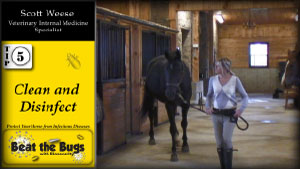ARCHIVE EQUINE NEWS STORIES
| Current news is available at TheHorsePortal.ca, Equine Guelph's online learning platform for practical, quick learning. Given the vast amount of information on horse health and welfare, Equine Guelph has archived its past news articles from 2002-2020. They are listed below, along with a search function available to find specific healthcare topics. | |
Emerging Diseases in the Equine IndustryJanuary 2015
Story by: Jillian Dasti
Horse health is one of the most important issues in the equine industry. Just like humans, horses have their own health concerns, including emerging infectious diseases. Horses by nature are social creatures, and many travel extensively, locally, nationally or internationally through competing and global sales. This means the risk of infection has never been more prevalent. Scientists have developed vaccines and treatments for various infections, but the pathogens involved have adapted, becoming more drug-resistant and infectious.
To combat this situation, researchers such as Dr. Scott Weese, from the Ontario Veterinary College, are investigating known and emerging infectious diseases. Weese studies the effects and changes in microbial populations in the horses’ digestive tracts, sources and carriers of infections, and investigates methods to control transmission of pathogens. In particular, he focuses on bacterial changes that can cause diarrhea or colic (including Clostridium difficile, a spore-forming bacterium that can cause diarrhea and inflammation of the colon) and various other important causes of disease such as equine influenza virus and equine herpesvirus.
Infectious diseases are often the cause of changes in horse health trends.
Weese’s research contributes to understanding how these pathogens operate and spread and their effects. This provides vital information for learning how to treat infected horses. “Scientists will never be able to completely eradicate infectious diseases, and pathogens will always evolve,” says Weese, “but this research will enable veterinarians to more easily recognize signs of disease, diagnose problems, and ultimately reduce sickness and suffering.”
Equine Guelph's next Biosecurity eWorkshop - April 20 - May 4
See the Video - Biosecurity tips for Horse Farms

